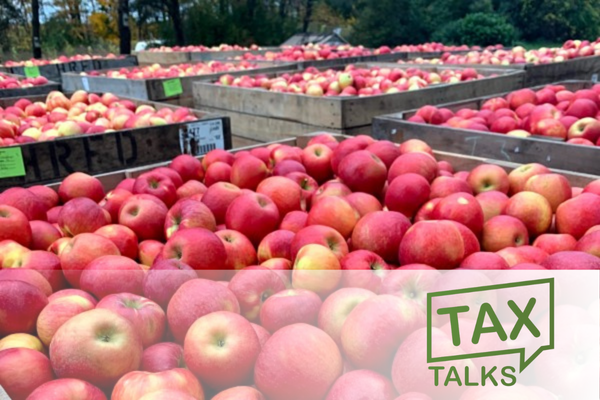October 29, 2024

As the 2024 growing and harvest season wraps up, many producers will be turning to their tax advisors to continue the year-end tax planning conversation. In this article, we examine a few areas that may be of interest to apple producers and their advisors.
Revisiting UNICAP Rules
Prior to 2018, the uniform capitalization rules (UNICAP) had required all farmers to capitalize pre-productive costs of plants that had a pre-productive period of more than two years. Farmers were able to opt out, but they were then required to utilize the alternative depreciation system (ADS), meaning their farm assets depreciated at a slower rate than other farmers who did not produce fruit or nut bearing trees.
The Tax Cuts and Jobs Act (TCJA) significantly changed these rules providing that “small taxpayers,” other than tax shelters, would not be subject to UNICAP and thus are able to expense or depreciate their pre-productive period costs. For the 2024 tax year, to qualify for this exception, a taxpayer must have average annual gross receipts of $30 million or less during the preceding three years.
Consolidation across the agricultural industry, vertical integration and value-added processes have all enabled significant rises in the gross income of farming businesses. It is important to evaluate the applicability of this exemption to your business if gross income is rising to the $30 million mark and work with a tax advisor to prepare yourself for the changes that could come if subject to UNICAP. The ability to opt out of UNICAP remains available with the concession of depreciating all assets under ADS.
It should be noted that this gross receipt test does come with aggregation rules. The test applies to any group of corporations or partnerships that would be treated as a single employer under IRC sections 52 or 414.
Declining Bonus Depreciation
Producers of fruit or nut bearing trees and vines with a pre-productive period of more than two years have retained their ability to claim bonus depreciation under IRC section 168(k)(5), by election, through January 1, 2027. This provision allows a producer to claim the bonus depreciation on these trees and vines when they are planted or grafted as opposed to when commercially viable (i.e. placed in service) regardless of if they are subject to UNICAP rules or not.
However, producers and their tax advisors should be aware that bonus depreciation is no longer at the 100% rate. Beginning with the 2023 tax year, the rate is phasing down following the schedule below:
|
Year |
Special Depreciation Allowance (Orchards) |
|
2020 |
100% |
|
2021 |
100% |
|
2022 |
100% |
|
2023 |
80% |
|
2024 |
60% |
|
2025 |
40% |
|
2026 |
20% |
|
2027 |
0% |
To demonstrate the impact of this change, consider an apple producer who incurred the following costs to plant high density orchards in both 2021 and 2024:
|
Year |
Planting Costs |
|
2021 |
$100,000 |
|
2024 |
$150,000 |
In both years, if the producer elected to claim bonus depreciation under 168(k)(5), the following depreciation deductions would be available in the year of planting:
|
Year |
Depreciation Deduction (168(k)(5)) |
|
2021 |
$100,000 ($100,000 cost x 100%) |
|
2024 |
$90,000 ($150,000 cost x 60%) |
Note that the residual $60,000 incurred in 2024 but not available for bonus depreciation, would begin to be utilized at commercial viability at which point regular bonus depreciation could be utilized subject to the rules at that time, or a standard Modified Accelerated Cost Recovery System (MACRS), assuming no requirement to utilize an alternative method, rate could be applied for a 10-year period.
The same principals will apply to producers who seek to accelerate their depreciation deductions on other asset purchases (vehicles, equipment, buildings, etc.). One notable difference is that the residual that cannot be claimed with bonus depreciation will begin depreciating in the year the asset is placed in service.
For example, consider a producer who invests $255,000 in farm equipment during the 2024 year. If bonus depreciation is taken, 60% of the investment would be depreciated in 2024 and the remaining 40% would begin depreciating over its useful life. Assuming this was all used equipment, the $255,000 investment would yield a maximum depreciation deduction of $167,576 in 2024 with bonus depreciation and MACRS utilized.
Insurance and Casualties
While no agricultural producer wants to have a crop loss due to adverse weather or other casualties, they do happen and the tax provisions surrounding these events should be considered.
Crop insurance payments are generally included in taxable income once received. In the case of fruit producers, often the crop insurance payment is an acceleration of income because the crop would have been sold in the subsequent year. Recognizing this potential disparity, the IRS allows a taxpayer to elect to defer their crop insurance proceeds so long as:
- They use the cash method of accounting, and
- They receive crop insurance/disaster payments in the same year as crops were damaged or destroyed, and
- They would normally have reported income from the crops in a following tax year under their normal business practice.
There are situations where crop insurance may cover the income loss from that year’s crop. For example, if the weather or casualty event did such irreparable damage that the producer must replant the land. In these situations, a producer may be able to expense the cost of replanting the crop, avoiding the general provisions of IRC 263A even if they were subject to UNICAP rules.
To apply this provision, the crop must be trees or bushes bearing an edible crop for human consumption that was lost or damaged while owned by the taxpayer with damage caused by freezing temperatures, disease, pests or another casualty. The producer may incur replanting costs on land beyond where the damage occurred to the extent the total planted acreage is unchanged. The same type of crop that was lost must be replanted, and the replanted land must be in the United States. While acreage cannot be changed, planting density may be different than what was destroyed.
Agriculture comes with tax complexities, but fruit and nut producers have even further intricacies. Whether the size and scale of your business is changing, TCJA provisions approach their sunset, or adverse events impact your operation, proactive tax planning and communication with a competent tax advisor is important to the success of your operation and the fulfillment of your goals.




